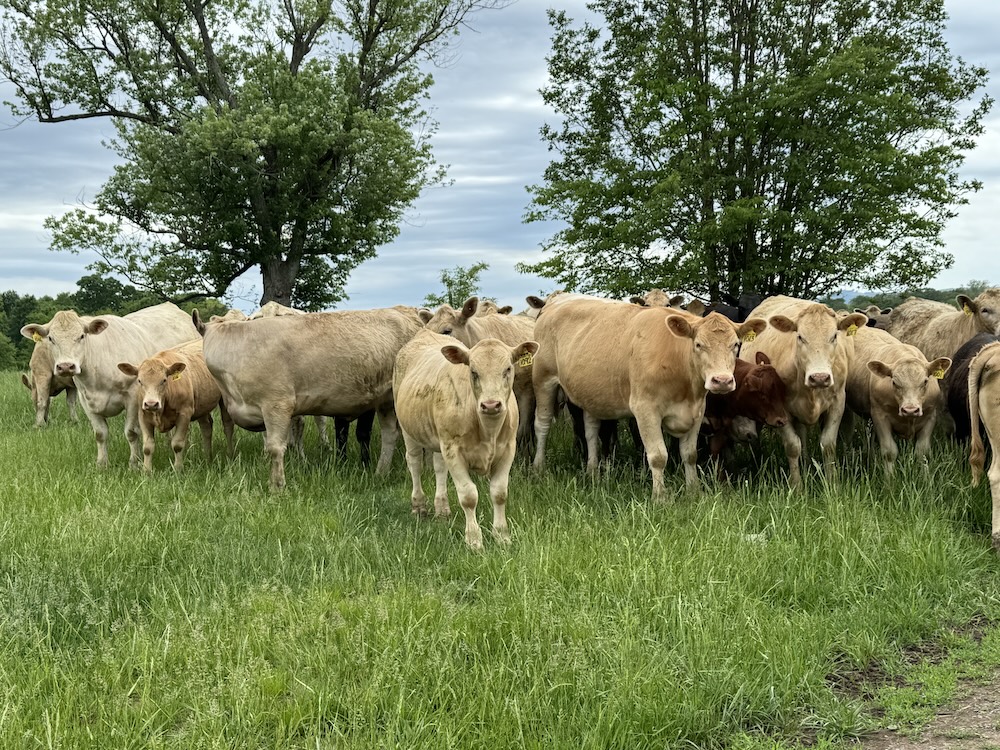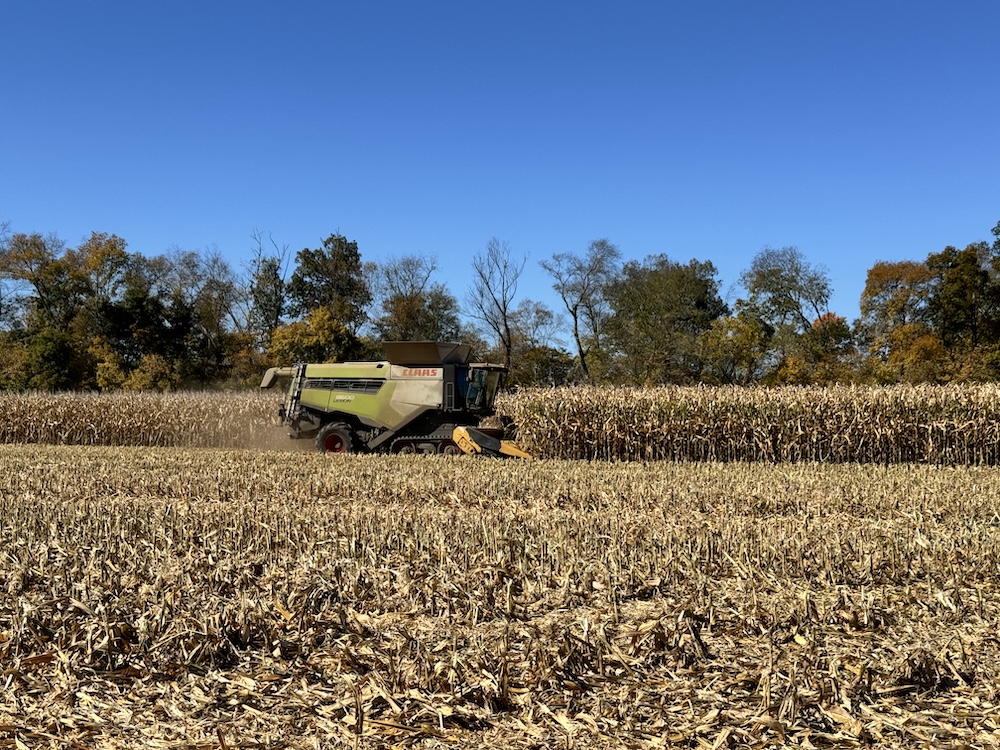Western View Plantation in Culpeper County gets its name from the panoramic vista of the Blue Ridge Mountains and Shenandoah National Park seen from its pastures and fields. This 700-acre working farm exemplifies the kind of agricultural operation that sustains a thriving rural economy.
Thanks to the efforts of many — including a farming family dedicated to conserving farmland for the continuation of our local food systems — PEC used $1.6 million of state and federal funding to purchase an Agricultural Land Easement that now permanently protects the excellent soils and streams that run through Western View. (For more information on the ALE program, see our story on Page 2.)
Owners Tom and Kim Nixon worked with The Piedmont Environmental Council and a slate of other partners to conserve Western View, the largest property placed into conservation easement in PEC’s nine-county region in 2024 and now the largest easement PEC holds.
“It could be the crown jewel of Culpeper County in 50 to 75 years because of its size, and there’s never going to be any major development on it,” says Kim Nixon.
For the Nixons, farming is a family operation. Tom grew up working on a farm in Orange County, and he and his wife Kim have been farming together in Orange and Culpeper counties for decades. They’ve instilled their love of farming in both their adult children, as well. Daughter Elizabeth manages the cow herd, overseeing spring and fall calving for about 1,000 cows. Son Robert manages the crop crew, which plants 5,500 acres of farmland that the Nixons lease or own in the area, including Western View.

At the Nixon’s Western View family farm, daughter Elizabeth oversees the cow herds, including about 1,000 calving cows in the springtime. Photo by Elizabeth Nixon
Even so, the Nixons know that a family farming legacy is not a guarantee. They have seen farmland lost around them over the years.
“This whole area is developing way too fast,” says Kim. “There’s a new data center within 5 miles of this farm. We want to preserve the land. We want our kids to have it.”
“It’s part of our livelihood. We want to protect the land and make it better so it will be productive for generations,” agrees Tom. “We want this to be a generational farm.”
The Nixon family knew they wanted to place Western View under a conservation easement when they first acquired it a decade ago. No strangers to the ALE program, they conserved Glenmary Farm in Orange County back in 2018, permanently protecting that 382-acre award-winning cattle, turkey and grain farm.
PEC’s work with the Nixons on Glenmary Farm established our model for accelerating farmland protection through the federal ALE program. Including Glenmary Farm, PEC has now secured over $6.7 million to purchase 10 ALE easements totaling over 3,400 acres.
Unlike traditional donated easements that offer tax incentives, ALE easements provide the landowner with a cash payment upfront. This makes conservation accessible to more landowners, including those who may not be able to pursue a donated easement.
“This model allows us to protect high quality agricultural soils in Virginia while allowing farmers to reinvest funds into their operations, land stewardship practices and the local agricultural economy,” says PEC Director of Conservation Mike Kane.
“Easements are a wonderful intersection between the goals of the land owner and the resources to be protected,” says Kane.
While conservation easements in general provide many benefits, from wildlife habitat to carbon sequestration, the federal ALE program is designed to protect two key resources in particular: water quality and prime agricultural soils.
“Top soil is not created overnight,” says Kane, noting the productive soils found at Western View. “It takes millennia to create the conditions that are good for agriculture. As the climate changes, the Piedmont is going to be one of the areas most suitable for agriculture and food production. Protecting the best soils for that food production is really important; it’s an established public good.”
This kind of landscape-level conservation has important ripple effects beyond Western View itself. Neighboring farmers have also protected hundreds of acres with conservation easements, something the Nixons hope will make the area a haven for agriculture for years to come. Local food systems and strong rural economies depend on working farmland. Conserving land under the ALE program helps ensure that land is not only protected, but stewarded in such a way that the benefits literally flow downstream.
“Clean local streams lead to a restored Chesapeake Bay,” says Kane. As part of the ALE program, the Nixons will protect 3 miles of stream frontage on Western View with riparian buffers. These buffers will improve not only local water quality, but also water quality for all communities and ecosystems downstream.

Emerging research also suggests that cropland and pastureland, like forestland, has the potential to sequester carbon from the atmosphere. At Western View, about 600 acres is open for crops and grazing, while about 100 acres will remain forested. Conserving land like this is an important tool for mitigating the effects of a changing climate that will impact our communities.
While PEC is the principal easement holder on Western View, many parties came together to make this project a reality. PEC purchased the conservation easement that now protects Western View with $1.1 million from the federal ALE program and a $500,000 grant from the Virginia Land Conservation Foundation. PEC’s Culpeper County Conservation Fund and the landowners contributed toward its continuing stewardship. The Culpeper Soil and Water Conservation District co-holds the easement with PEC, an innovative partnership that allows PEC to learn from their staff’s knowledge.
“It’s really fantastic to have the technical expertise of Culpeper Soil and Water as a partner in this. To be able to confer with their professionals and share knowledge is really advantageous,” says Kane.
Wanting to protect farmland from being lost to sprawling developments and data centers, Tom and Kim are enthusiastic supporters of the ALE program. But the timeline isn’t always a speedy one. “It’s a lot of hurry up and wait,” Kim laughs about their three-year process. Still, they agree that they would encourage other farmers to pursue ALE.
“I wish there were more funds so groups like PEC could get even more farmland under easement to protect it and save it,” says Kim.
“We would do it again,” agrees Tom about using ALE. “If we buy another farm, we will do it.”
This article appeared in the 2025 Spring edition of The Piedmont Environmental Council’s member newsletter, The Piedmont View. If you’d like to become a PEC member or renew your membership, please visit pecva.org/join.
